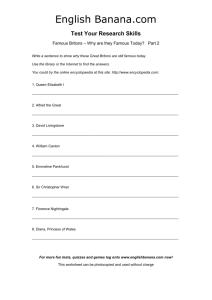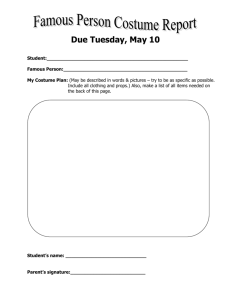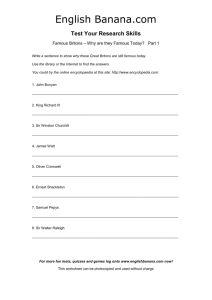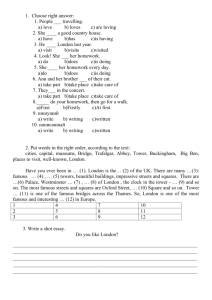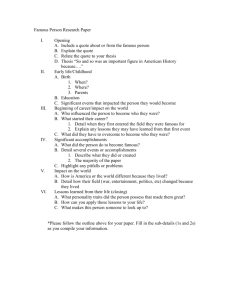Naomi Shihab Nye: Selected Poems
advertisement
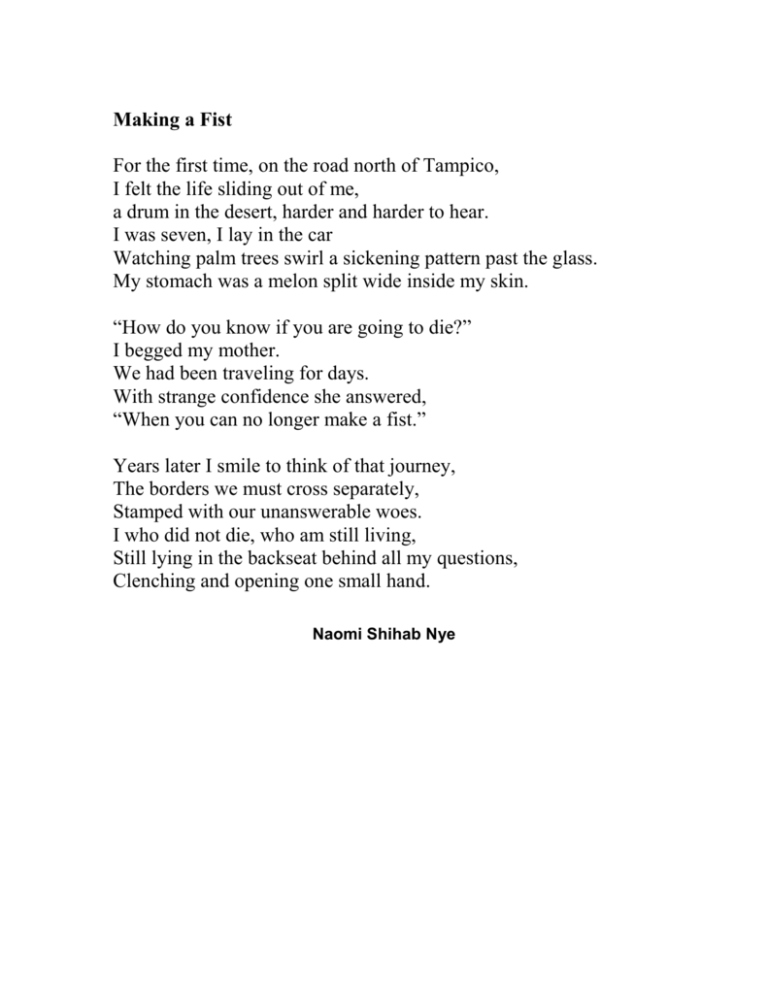
Making a Fist For the first time, on the road north of Tampico, I felt the life sliding out of me, a drum in the desert, harder and harder to hear. I was seven, I lay in the car Watching palm trees swirl a sickening pattern past the glass. My stomach was a melon split wide inside my skin. “How do you know if you are going to die?” I begged my mother. We had been traveling for days. With strange confidence she answered, “When you can no longer make a fist.” Years later I smile to think of that journey, The borders we must cross separately, Stamped with our unanswerable woes. I who did not die, who am still living, Still lying in the backseat behind all my questions, Clenching and opening one small hand. Naomi Shihab Nye Famous The river is famous to the fish. The loud voice is famous to silence, which knew it would inherit the earth before anybody said so. The cat sleeping on the fence is famous to the birds watching him from the birdhouse. The tear is famous briefly, to the cheek. The idea you carry close to your bosom is famous to your bosom. The boot is famous to the earth, more famous than the dress shoe, which is famous only to floors. The bent photograph is famous to the one who carries it and not at all famous to the one who is pictured. I want to be famous to shuffling men who smile while crossing streets, sticky children in grocery lines, famous as the one who smiled back. I want to be famous in the way a pulley is famous, or a buttonhole, not because it did anything spectacular, but because it never forgot what it could do. Naomi Shihab Nye The Man Who Makes Brooms So you come with these maps in your head and I come with voices chiding me to “Speak for my people” and we march around like guardians of memory till we find the man on the short stool who makes brooms. Thumb over thumb, straw over straw, he will not look at us. In his stony corner there is barely room For baskets and thread, much less the weight of our faces staring at him from the street. What he has lost or not lost is his secret. You say he is like all the men, The man who sells pistachios, The man who rolls the rugs. Older now, you find holiness in anything that continues, dream after dream. I say he is like nobody, the pink seam he weaves across the flat golden face of this broom is its own shrine, and forget about the tears. In the village the unlces will raise their kefiyahs from dominoes to say, no brooms in America? And the girls who stop to sweep the courtyard will stop for moment and cock their heads. It is a little song, this thumb over thumb, But sometimes when you wait years for the air to break open and sense to fall out, it may be the only one. Jerusalem Blood "A true Arab knows how to catch a fly in his hands," my father would say. And he'd prove it, cupping the buzzer instantly while the host with the swatter stared. In the spring our palms peeled like snakes. True Arabs believed watermelon could heal fifty ways. I changed these to fit the occasion. Years before, a girl knocked, wanted to see the Arab. I said we didn't have one. After that, my father told me who he was, "Shihab"--"shooting star"-a good name, borrowed from the sky. Once I said, "When we die, we give it back?" He said that's what a true Arab would say. Today the headlines clot in my blood. A little Palestinian dangles a truck on the front page. Homeless fig, this tragedy with a terrible root is too big for us. What flag can we wave? I wave the flag of stone and seed, table mat stitched in blue. I call my father, we talk around the news. It is too much for him, neither of his two languages can reach it. I drive into the country to find sheep, cows, to plead with the air: Who calls anyone civilized? Where can the crying heart graze? What does a true Arab do now? A Poem at the End and the Beginning The Arabs used to say, When a stranger appears at your door, feed him for three days before asking who he is, where he's come from, where he's headed. That way, he'll have strength enough to answer. Or, by then you'll be such good friends you don't care. Let's go back to that. Rice? Pine nuts? Here, take the red brocade pillow. My child will serve water to your horse. No, I was not busy when you came! I was not preparing to be busy. That's the armor everyone put on at the end of the century to pretend they had a purpose in the world. I refuse to be claimed. Your plate is waiting. We will snip fresh mint into your tea. Naomi Shihab Nye Naomi Shihab Nye Poems Making a Fist For the first time, on the road north of Tampico, I felt the life sliding out of me, a drum in the desert, harder and harder to hear. I was seven, I lay in the car Watching palm trees swirl a sickening pattern past the glass. My stomach was a melon split wide inside my skin. “How do you know if you are going to die?” I begged my mother. We had been traveling for days. With strange confidence she answered, “When you can no longer make a fist.” Years later I smile to think of that journey, The borders we must cross separately, Stamped with our unanswerable woes. I who did not die, who am still living, Still lying in the backseat behind all my questions, Clenching and opening one small hand. Famous The river is famous to the fish. The loud voice is famous to silence, which knew it would inherit the earth before anybody said so. The cat sleeping on the fence is famous to the birds watching him from the birdhouse. The tear is famous briefly, to the cheek. The idea you carry close to your bosom is famous to your bosom. The boot is famous to the earth, more famous than the dress shoe, which is famous only to floors. The bent photograph is famous to the one who carries it and not at all famous to the one who is pictured. I want to be famous to shuffling men who smile while crossing streets, sticky children in grocery lines, famous as the one who smiled back. I want to be famous in the way a pulley is famous, or a buttonhole, not because it did anything spectacular, but because it never forgot what it could do. The Man Who Makes Brooms So you come with these maps in your head and I come with voices chiding me to “Speak for my people” and we march around like guardians of memory till we find the man on the short stool who makes brooms. Thumb over thumb, straw over straw, he will not look at us. In his stony corner there is barely room For baskets and thread, much less the weight of our faces staring at him from the street. What he has lost or not lost is his secret. You say he is like all the men, The man who sells pistachios, The man who rolls the rugs. Older now, you find holiness in anything that continues, dream after dream. I say he is like nobody, the pink seam he weaves across the flat golden face of this broom is its own shrine, and forget about the tears. In the village the unlces will raise their kefiyahs from dominoes to say, no brooms in America? And the girls who stop to sweep the courtyard will stop for moment and cock their heads. It is a little song, this thumb over thumb, But sometimes when you wait years for the air to break open and sense to fall out, it may be the only one. Jerusalem Blood "A true Arab knows how to catch a fly in his hands," my father would say. And he'd prove it, cupping the buzzer instantly while the host with the swatter stared. In the spring our palms peeled like snakes. True Arabs believed watermelon could heal fifty ways. I changed these to fit the occasion. Years before, a girl knocked, wanted to see the Arab. I said we didn't have one. After that, my father told me who he was, "Shihab"--"shooting star"-a good name, borrowed from the sky. Once I said, "When we die, we give it back?" He said that's what a true Arab would say. Today the headlines clot in my blood. A little Palestinian dangles a truck on the front page. Homeless fig, this tragedy with a terrible root is too big for us. What flag can we wave? I wave the flag of stone and seed, table mat stitched in blue. I call my father, we talk around the news. It is too much for him, neither of his two languages can reach it. I drive into the country to find sheep, cows, to plead with the air: Who calls anyone civilized? Where can the crying heart graze? What does a true Arab do now? A Poem at the End and the Beginning The Arabs used to say, When a stranger appears at your door, feed him for three days before asking who he is, where he's come from, where he's headed. That way, he'll have strength enough to answer. Or, by then you'll be such good friends you don't care. Let's go back to that. Rice? Pine nuts? Here, take the red brocade pillow. My child will serve water to your horse. No, I was not busy when you came! I was not preparing to be busy. That's the armor everyone put on at the end of the century to pretend they had a purpose in the world. I refuse to be claimed. Your plate is waiting. We will snip fresh mint into your tea. The Last Day of August A man in a lawn chair with a book on his lap realizes pears are falling from the tree right beside him. Each makes a round, full sound in the grass. Perhaps the stem takes an hour to loosen and let go. This man who has recently written words to his father forty years in the birthing: I was always afraid of you, When would you explode next? has sudden reverence for the pears. If a dark bruise rises, if ants inhabit the juicy crack, or the body remains firm, unscarred, remains secret till tomorrow . . . By then the letter to his father may be lying open on a table. We gather pears in baskets, sacks. What will we do with everything that has been given us? Ginger pears, pear pies, fingers weighing flesh. Which will be perfect under the skin? It is hard not to love the pile of peelings growing on the counter next to the knife. Half-and-Half You can't be, says a Palestinian Christian on the first feast after Ramadan. So, half-and-half and half-and-half. He sells glass. He knows about broken bits, chips. If you love Jesus you can't love anyone else. Says he. At his stall of blue pitchers on the Via Dolorosa he's sweeping. The rubbed stones feel holy. Dusting of powdered sugar across faces of date-stuffed mamool. This morning we lit the slim candles which bend over at the waist by noon. For once the priests weren't fighting in church for the best spots to stand. As a boy, my father listened to them fight. This is partly why he prays in no language but his own. Why I press my lips to every exception. A woman opens a window -- here and here and here -placing a vase of blue flowers on an orange cloth. I follow her. she is making soup from what she had left in the bowl, the shriveled garlic and bent bean. She is leaving nothing out.


